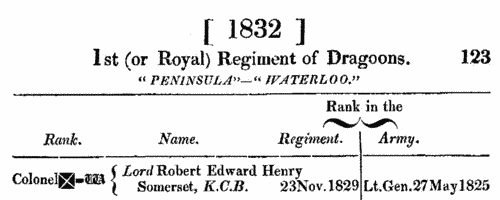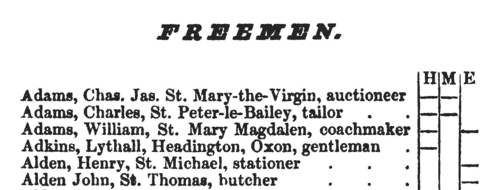Add this eBook to your basket to receive access to all 168 records. Our indexes include entries for the spelling looker. In the period you have requested, we have the following 168 records (displaying 91 to 100): These sample scans are from the original record. You will get scans of the full pages or articles where the surname you searched for has been found. Your web browser may prevent the sample windows from opening; in this case please change your browser settings to allow pop-up windows from this site. Officers of the British Army
(1832)
The annual Army List, published By Authority, first lists officers of the rank of major and above, by rank, and with dates of appointment to each successive higher rank; holders of crosses, crosses with clasps (with number of clasps indicated), medals, medals with clasps (with number of clasps indicated) are marked as such; and an ornate W indicates those officers actually present in any of the actions of 16, 17 or 18 June 1815 and therefore awarded the Waterloo Medal. For each officer in this section, the final column notes his then present or immediately former regiment and/or office, if any. Next, all the officers of the army are listed, down to the rank of ensign, by regiment or corps, giving rank, name, date of rank in the regiment, and date of rank in the army, with occasional further notes. Again, holders of medals are duly noted, as in the first list. For each regiment the paymaster, adjutant, quartermaster, surgeon and assistant surgeons are named, as well as the civilian agent; and the regimental motto, battle honours, and colours of the facings and lace of the dress uniform are stated. After the British regiments of the line, the officers of the West India infantry, the Ceylon rifles, the Royal African Colonial Corps, the Cape Mounted Riflemen, the Royal Newfoundland Veterans, and the Royal Malta Fencibles are given; then the officers of the garrisons and other military establishments in Great Britain, Ireland, North America and Gibraltar (with Malta); the Royal Artillery; Commissariat Department; Medical Department; Chaplains' Department; officers retained on full pay; officers on British half pay; and officers on Foreign half pay (including the German Legion, the Brunswick Cavalry, the Brunswick Infantry, Chasseurs Brittaniques, Corsican Rangers, Dillon's Regiment, the Greek Light Infantry, Malta Regiment, Meuron's Regiment, Roll's Regiment, Sicilian Regiment, Watteville's Regiment, and the York Light Infantry Volunteers). | Sample scan, click to enlarge

| Freemen of the City of Oxford
(1834)
A List of the Freemen and Householders of the City of Oxford, Registered July 31st, 1834, as Entitled to Vote in the Election of Members for the said City. This starts with an alphabetical list of the freemen of the city, which gives (as in the sample scan) full name, address and occupation. Then follow lists of householders, by parish or ward, but without giving occupations. | Sample scan, click to enlarge

| Petitioning Creditors and Solicitors
(1835)
Principal creditors petitioning to force a bankruptcy (but often close relatives of the bankrupt helping to protect his assets): and solicitors | Sample scan, click to enlarge

| Poachers committed to prison at Abingdon in Berkshire
(1833-1836)
In response to a parliamentary enquiry, returns were made in early 1836 from each of the gaols in England and Wales of the number of commitments, prosecutions, convictions and sentences under the game laws since 1 November 1833. The returns varied in scope; most give the full name of each poacher, date, and sentence. The usual offence is that of 'poaching', i. e. being out armed in the night in pursuit of game; occasionally it was aggravated by assaulting a gamekeeper &c. | Sample scan, click to enlarge

| Poachers committed to prison at Reading in Berkshire
(1833-1836)
In response to a parliamentary enquiry, returns were made in early 1836 from each of the gaols in England and Wales of the number of commitments, prosecutions, convictions and sentences under the game laws since 1 November 1833. The returns varied in scope; most give the full name of each poacher, date, and sentence. The usual offence is that of 'poaching', i. e. being out armed in the night in pursuit of game; occasionally it was aggravated by assaulting a gamekeeper &c. | Sample scan, click to enlarge

| Bankrupts
(1836)
Bankruptcy notices for England and Wales: bankruptcy often caused people to restart their lives elsewhere, so these are an important source for lost links
| Sample scan, click to enlarge

| Bankrupts
(1837)
Bankruptcy notices for England and Wales: bankruptcy often caused people to restart their lives elsewhere, so these are an important source for lost links
| Sample scan, click to enlarge

| Freemen Voters in Oxford
(1837)
A poll of the freemen and non-freemen electors of the City of Oxford took place on 25 July 1837, the candidates being William Hughes Hughes (H), Donald Maclean (M) and William Erle (E). This poll book lists all 2145 voters, as well as those electors who did not vote. In both cases, the lists are divided into a single register of freemen, and then the non-freemen arranged by parish or ward - All Saints, Cowley, Holywell, St Aldate, St Clement, St Ebbe, St Giles, St John, St Martin, St Mary Magdalen, St Mary the Virgin, St Michael, St Peter in the East, St Peter le Bailey, and St Thomas. The votes of those who voted are shown on the right hand side of the page. The names of the freemen are given with address and occupation; those of non-freemen with address, but without stating occupation. | Sample scan, click to enlarge

| Trustees and Solicitors
(1837)
Trustees appointed to take over bankrupts' estates in England and Wales, and their solicitors. Trustees are often friends or relatives of the bankrupt: and/or principal creditors
| Sample scan, click to enlarge

| Trustees and Solicitors
(1838)
Trustees appointed to take over bankrupts' estates in England and Wales, and their solicitors. Trustees are often friends or relatives of the bankrupt: and/or principal creditors
| Sample scan, click to enlarge

|
Research your ancestry, family history, genealogy and one-name study by direct access to original records and archives indexed by surname.
|











